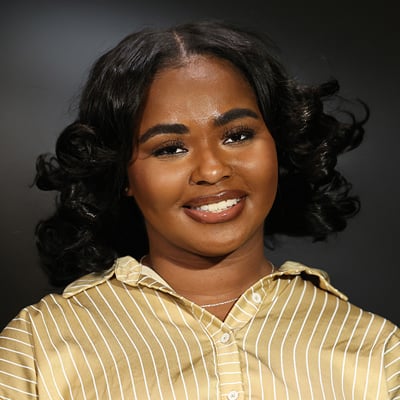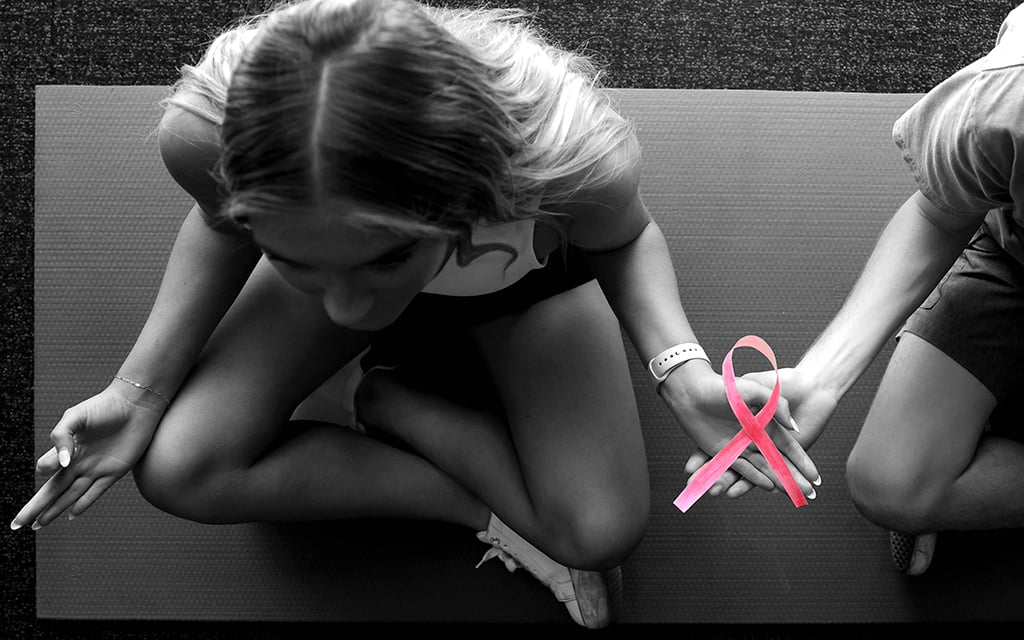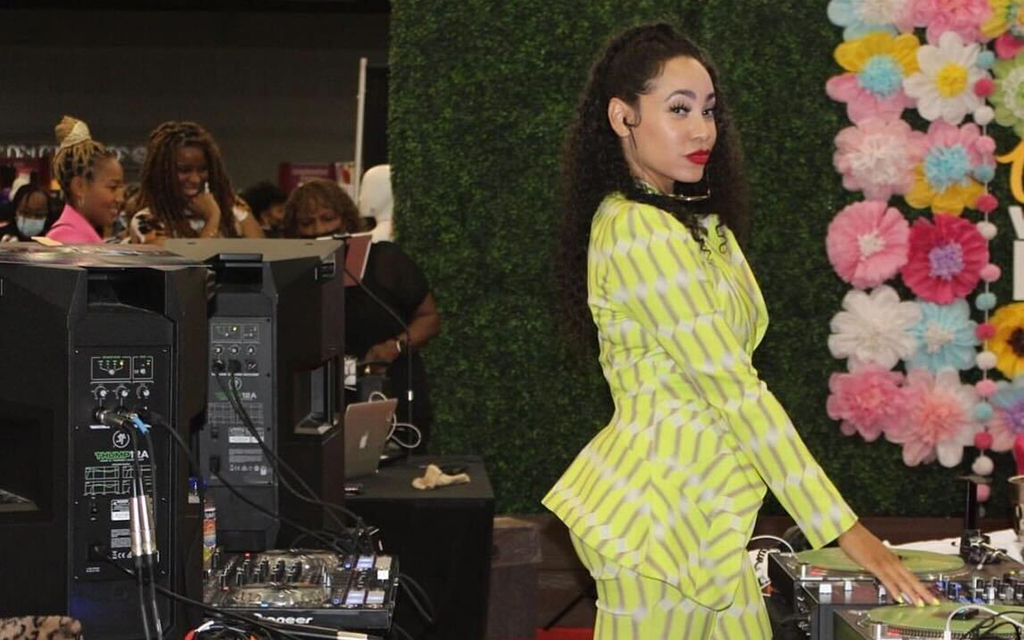
Bathsheba Adams, a former track athlete and founder of Eyes Like Mine, Inc., faces a breast cancer diagnosis with determination and hopes to return to her community service. (Photo courtesy of Bathsheba Adams)
PHOENIX – As Bathsheba Adams’ doctor turned the dial on the examination chair to position it upright after a breast ultrasound in March, she was not prepared for the news to come.
Without a biopsy, her doctor prematurely diagnosed her with breast cancer based on their ultrasound observations.
“I honestly began to cry,” Adams said. “I knew my life was not going to be the same as I knew it. My instincts just told me it was time to start thinking of a plan.”
Unfortunately, Adams already had a relationship with hardship. As a foster child, she moved around often, taking on maternal responsibilities at a young age to alleviate some of the burden from the foster parents. She went on to run track at the University of Indianapolis while pursuing small acts of service along the way.
That service brought her to the Valley, where she runs Eyes Like Mine, Incorporated, a nonprofit organization to help foster families with basic necessities.
As the 38-year-old began to hit her stride earlier this year, she bought a local family a van, but her breast cancer diagnosis stalled any progress she had built after taking on a career as a disc jockey to support the foundation.
“The name of my foundation comes from looking into the eyes of hundreds of kids and seeing myself,” Adams said. “I want to continue to give back but right now I barely have the means to take care of myself.”
Before her breast cancer diagnosis in March, a year ago Adams was faced with a similar scare that she ignored until she no longer could. She woke up one morning and felt a lump in her arm but only thought she had fallen asleep with her iPhone under her arm.
“When people have various familial roles or multiple jobs, they often put off going to see a doctor,” Atlanta breast surgical oncologist Dr. Ryland J Gore said. “Some patients simply do not want to know. I always tell patients if you feel something, say something.”
Last year, she eventually went to have the growth examined, and was told by her doctor she had non-life threatening breast tissue in her arm. While Adams was getting her arm examined, she decided to get a mammogram.
That mammogram from 2022 showed no cancerous tissue but this year’s ultrasound and biopsy revealed cancer in two places in her breast, a grade two tumor and a grade three tumor.
“The grade of the tumor helps tell what the pathologist sees when they are looking at the cancer under the microscope,” Gore said. “If something is grade one or low grade that means components of the cancer cells have a lot of similarities to a normal cell. A grade two tumor is intermediate. A grade three tumor is high grade and the cancer has features that are slightly more aggressive.”
The biopsy results prompted doctors to schedule a double mastectomy and reconstruction for Adams a month later. She suffered an unlikely severe infection from the surgery and the doctors had to undo their initial reconstruction work. Gore explained only four percent of mastectomy patients contract infections.
Adams’ series of unlikely symptoms also includes loss of consciousness on multiple occasions, seizures and blindness for two hours.
“My skin was dying and began to turn black and blue,” Adams said. “Going into the surgery, my doctor explained to me the surgery was a very low risk, so when they told me I had an infection I automatically thought, ‘Why me?””
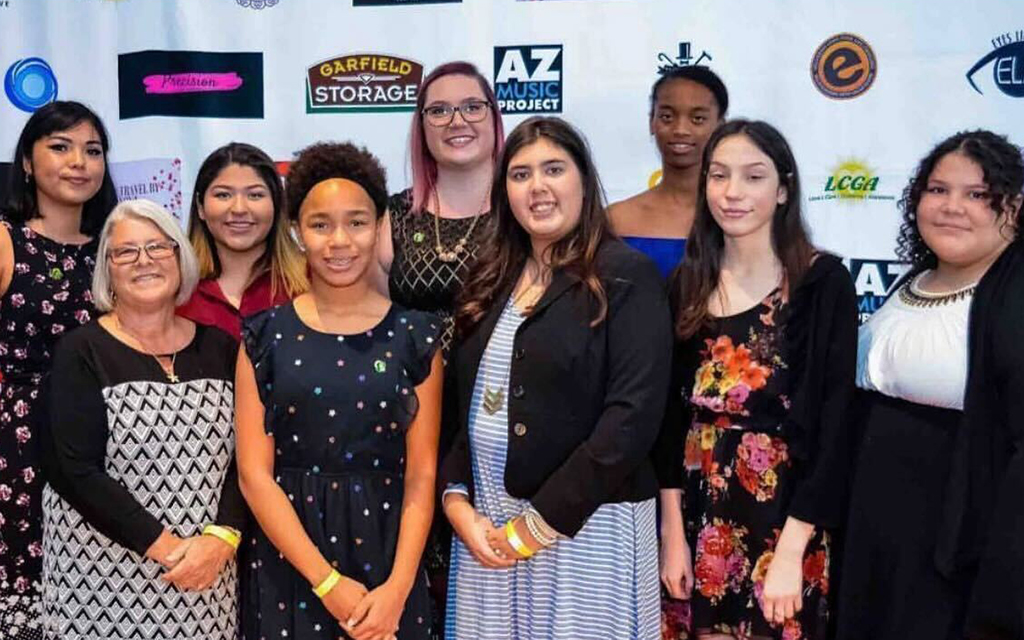
Eyes Like Mine, Inc., a nonprofit organization, supports foster families by providing essentials, school supplies and unique experiences for children in need. (Photo courtesy of Bathsheba Adams)
The removal of her breasts made her feel less feminine and not as confident, Adams said, with the void leading to her reconsidering reconstruction.
In August, Adams went under the knife again.
“When patients suffer from larger tumors, chemotherapy and radiation are often used,” said Dr. Patricia A. Ganz, Director of Cancer Prevention and Control Research at UCLA’s Jonsson Comprehensive Cancer Center. “Younger patients typically have larger tumors and are diagnosed later because they don’t think of it but this causes them to have more intensive treatments.”
Adams’ oncologist wants her to take chemotherapy medication for the next five years. But after her earlier surgery complications, Adams is hesitating getting started.
“I am terrified,” Adams said. “I am still trying to process if I should do it or not. I know when I begin to take it, my body is going to continue to go through changes that I’m not sure I am ready for.”
For the majority of Adams’ life, there has been a cloud of fear looming over her, an uncertainty of her next steps.
Adams grew up as a foster child with 10 siblings in three different homes with her longest stay lasting six years. In between each home, she spent a stint with her birth mother but those moments were often short, Adams said, due to her mother’s abusive ways as a result of schizophrenia.
Schizophrenia can produce unpredictable delusions, hallucinations, disorganized speech and lack of motivation, according to the American Psychiatric Association.
“While I was in different homes, I was definitely a little mama bear,” Adams said. “I changed diapers, made bottles, cleaned up and did laundry.”
At the age of 16, Adams’ foster mother removed her from the home, leaving her homeless in 2002. She stayed with multiple friends to get through her senior year of high school in Indianapolis, long enough to graduate and keep a roof over her head in 2003.
The Warren Central High School standout won multiple MVP awards in track, which landed her a Division II scholarship to the University of Indianapolis. She also had offers from Arizona State, UCLA, Texas and Baylor but preferred to stay home.
The greyhound ran up to six events per meet in college, including the 100-meter hurdles, 400-meter hurdles and 4×200 relay.
While Adams’ health appeared to peak in college, she was internally fighting postural orthostatic tachycardia syndrome (POTS). POTS occurs when an individual has reduced blood volume and mostly affects women between the ages of 15-50.
“I would always be the last person to get on the bus to go home from away meets,” Adams said. “Sometimes, I would go to pick things up and the blood flow to my head would be delayed. I would even feel lightheaded and faint occasionally.”
Adams’ POTS symptoms were activated during most physical activity. She managed her disease by staying in cooler temperatures. Due to weather elements and unpredictable temperatures when she competed in outdoor track, POTS became larger than any hurdle Adams faced on the track and ended her athletic career in 2008.
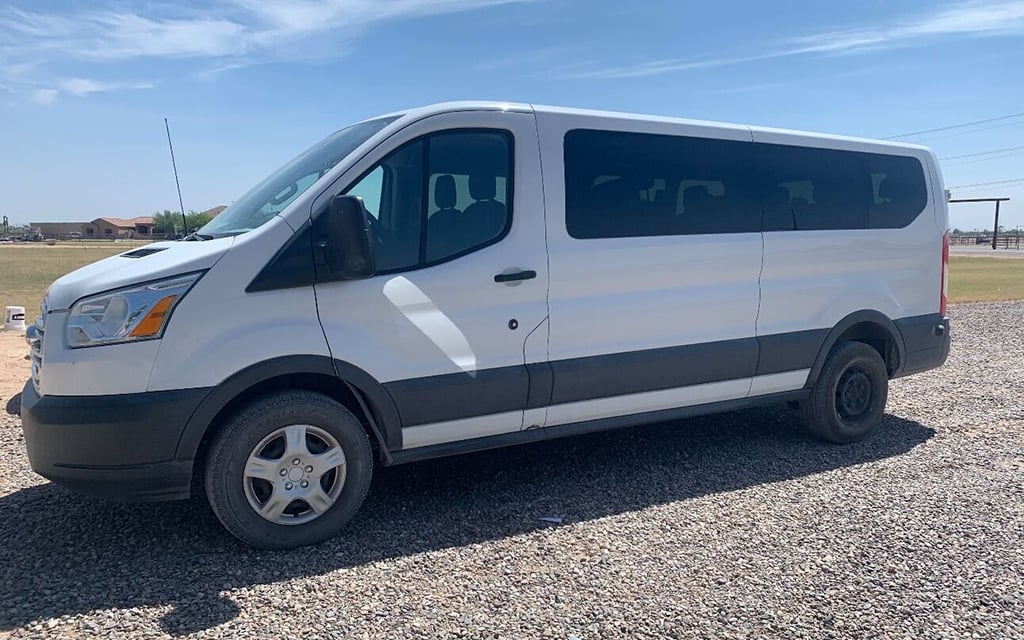
Bathsheba Adams gifted a much-needed van to a large foster family before her cancer diagnosis forever changed her life. (Photo courtesy of Bathsheba Adams)
Luckily for Adams, her life is fueled by many passions making putting her cleats down a bit easier. While at Indianapolis, she majored in criminal justice.
“I always wanted to be the cop that everyone could rely on to do the right thing,” Adams said. “The outlook of police officers isn’t always the greatest. I wanted people to know that any problem they had, they could bring it to me no matter if I was a local cop, detective or even in the secret service.”
Adams shelved her law interest but would later revisit it while taking time to give back to her community in effort to improve the lives of the people.
Upon graduation from college in 2008, the retired track star did not have the resources to navigate adulthood or a place to begin her search for an entry level job. This prompted her to start her own foundation. Before the foundation had thousands of eyes on it, Adams started with small acts, including handing out bags with toothbrushes and dental floss to encourage healthy habits.
Eyes Like Mine, Inc. helps with building resumes, providing free school supplies and sending children in groups of 100 to sporting events around the Valley.
“Usually, these young adults did not learn much in school,” Adams said. “When they were in class, they couldn’t focus. Instead, they were trying to process their feelings of abandonment and displacement. There’s so much going on that the brain is dealing with during that time period along with no support system.”
While Adams was determining if she wanted to continue her pursuit of a law enforcement career or go another avenue, her desire to continue her work in foster care was fueled by an early interaction with Hall of Fame quarterback Peyton Manning.
When she was 13, Manning, a five-time NFL MVP, brought gifts and food to Adams’ foster home in Indianapolis while he was in his prime with the Indianapolis Colts. Manning graciously gave a motivational speech and stayed for hours to take pictures with all the kids in the neighborhood.
“It was a special moment for me,” Adams said. “It will always stick with me because here this guy is during the best years of his career and he’s taking time out to do something for kids that he doesn’t know. This is one of the main reasons why I started my nonprofit. He put a smile on my face over 20 years ago, and I want to do that for others.”
To help expand her reach and to get more eyes on Eyes Like Mine, she signed with a public relations agency. Adams told the agency about her life-changing interaction with her hero and the agency immediately contacted multiple sports journalists covering the Colts and Colts employees to connect the two.
A week later, Manning personally called Adams’ cell phone and wanted to hear her life update. In 2019, at the foundation’s annual fundraising gala, Adams honored Manning with a humanitarian award. Although the two-time Super Bowl champion could not be in attendance, he sent in a studio video thanking Adams for the honor.
Adams was not able to find a consistent donor for the financial needs of the organization she founded. After moving to Arizona to work closer to an event planner, she learned how to disc jockey by shadowing many well-known DJs around the Valley. The event planner had a long history of planning successful fundraising events and seemed to be the missing piece to Adams’ puzzle.
Adams used the money she earned from DJing to fund the needs of foster children across the country, her events and galas. Her success as a DJ allowed her to buy a 2017 Ford Transit van for a couple fostering four children with three adopted children and five biological children of their own. The new car replaced an unreliable van that often malfunctioned and left the family on the side of the road.
Adams made monthly payments of $750 for the van, until six months into the agreement, when Adams received her traumatizing news. The breast cancer diagnosis curtailed her ability to DJ sets that often lasted seven hours. This left Adams with no way to fund Eyes like Mine, Inc. or the family’s van.
“Once I knew I was not going to be able to get back to work, I knew I wasn’t going to be able to afford the van,” Adams said. “I was left extremely brokenhearted. I am a person of my word and I don’t play around when I say I am going to do something. They are very understanding, but I would still like to do what I said I was going to do.”
Gore and Ganz explained the actual mastectomy Adams endured is not what is draining her energy. During surgery, the surgeon does a lymph node biopsy under the patient’s arm. This area is muscular and causes disruption to the lymphatic vessels, which causes limited range of motion and fatigue.
“To help people understand how breast surgery patients feel, I often compare it to someone with COVID-19,” Ganz said. “When someone has COVID, they just feel wiped out because of the inflammation they experience.”
Although the family still has $25,000 left to pay on the car loan, the mother of the 15-person household said she is immensely grateful for Adams’ help over the years. Her giving heart has allowed the couple the means to begin the process of fostering their eighth additional child.
Adams is currently recovering from her third breast surgery after giving herself another chance to regain the femininity she believes she lost. She is trying to increase her mobility by sticking to her everyday routine.
“One thing I tell my patients to do is to make sure they are staying physically active,” Ganz said. “It seems counterintuitive but it turns out regular physical activity is very important to break the cycle of fatigue.”
Although Adams is on mostly bed rest, the humanitarian is taking advantage of her downtime and has passed all of her initial tests to get her commercial driver’s learning permit. She is currently in the process of finishing the last few steps to get her full license.
“Through it all, I’ve always made a way for myself,” Adams said. “I’ve never had to deal with something like this (cancer) at this level but I keep believing in God. I know there are so many families out there that need help and I can’t stop now. If other people that have helped me in the past stopped a long time ago, then I wouldn’t have much now.”
